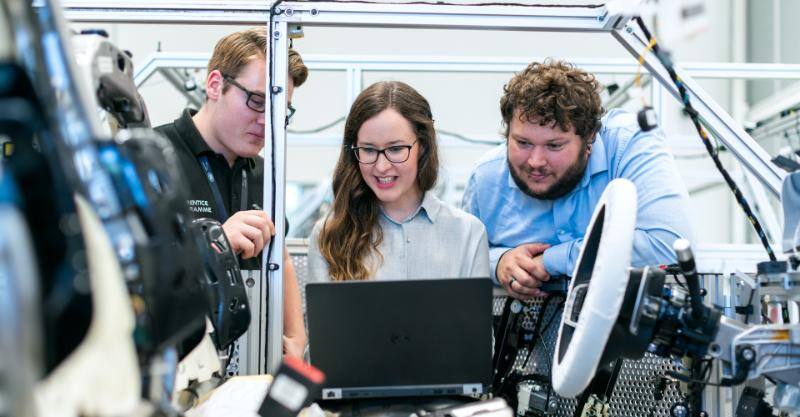Top Tools and Resources Every Engineer Student Needs for Success
-
Posted by
 Red Pitaya Technical Editorial Team
, August 21, 2024
Red Pitaya Technical Editorial Team
, August 21, 2024

Summer is ending, and it's time to get ready for a new school year. If you're an engineer student, you'll need some important tools and gadgets to help with your studies. Whether you're just beginning or close to finishing your degree, having the right things can really make a difference. Here's a simple and fun guide to what every engineer student should have, including the very useful Red Pitaya board, which can be your helpful companion from your first year all the way through graduation and beyond! Check our list of essential tools and resources for engineering students.
1. High-Quality Laptop
First things first, you need a good laptop. Not just any laptop, but one that can handle all the heavy-duty software you'll be using, like AutoCAD, MATLAB, and SolidWorks. Aim for something with a powerful processor, lots of RAM (at least 16GB), a good graphics card and make sure the laptop has plenty of storage. With all the programs (and games) you'll be installing, you'll need at least 1 TB of space, if not more.. Don’t forget portability and battery life, because you'll be taking it everywhere!
Always purchase computers, laptops, and other components from a trusted source. If you're unsure, ask a friend or check online forums for advice. If you're building a computer from scratch, ask your "computer geek" friend (we all have one) for help with choosing the components.
2. Software Subscriptions
Software is your best friend in engineering. Here are some must-haves:
- AutoCAD: For all your design needs.
- MATLAB: For crunching numbers and developing algorithms.
- SolidWorks: For 3D design and modeling.
Avoid pirating expensive software. While it might seem like a way to save money, it's easy for a virus to be hidden within the program code you download. The last thing you want is to wipe your disk and reinstall your operating system and programs. Instead, check if your university offers software licenses or look for alternative programs that don't require expensive licenses—you'll be surprised by the quality of the alternatives available.
3. Red Pitaya Board
Meet your new best friend, engineer student: the Red Pitaya board. This little gadget is like the Swiss Army knife of engineering tools. It can be an oscilloscope, a spectrum analyzer, a function generator, and more. Here's why you need it:
- Versatility: The Red Pitaya board can be used in a wide range of courses, from introductory electronics to advanced signal processing.
- Cost-Effective: Why buy lots of expensive lab equipment when one Red Pitaya board does it all?
- Portability: It’s small and easy to carry, perfect for labs, dorms, and study sessions.
- Longevity: You usually lose access to all the expensive equipment after graduation, but with the Red Pitaya board, you’ll always have these tools with you, even in your professional career.
.jpg?width=800&height=450&name=Untitled%20design%20(5).jpg)
4. Professional Toolkits
Every engineer needs a good toolkit. Depending on your focus, you might need:
- Mechanical Engineers: Wrenches, screwdrivers, pliers, and more.
- Electrical Engineers: A resistor kit, capacitor kit, and breadboard are essential. Depending on the projects you're working on, a 3D printer might also be a good investment.
- Civil Engineers: Laser levels, measuring tapes, and drafting tools.
Having the right tools can save you a lot of time and hassle.
5. Scientific Calculator
A scientific calculator is a must-have. The Texas Instruments TI-84 or the Casio FX-991EX are great options. They handle complex calculations like a pro (just like you!).
.jpg?width=800&height=450&name=Untitled%20design%20(4).jpg)
6. Books and Reference Materials
As an engineer student, you’ll receive plenty of books from your courses, but having extra references can be incredibly helpful:
- Core Textbooks: For subjects like calculus, physics, and your specific engineering discipline.
- Handbooks: Engineering handbooks with standards, formulas, and best practices.
- Guides: Manuals for software and tools you’ll use often.
Some of the books and articles you need might be extremely expensive, so check if you can access PDF versions through your institution using your student email. You can also save money by befriending seniors and kindly asking if they can share last year's books.
7. Lab Notebooks and Journals
Documenting your experiments and projects is crucial. Get a durable lab notebook with grid paper for sketches and notes. Keeping a personal engineering journal can also help track your progress and ideas.
If writing on paper isn’t your thing, consider getting a graphics tablet to keep all your notes on your computer. Taking your own notes during classes will help you memorize the topics discussed. When studying, refer to your notes to recall information that isn’t written down.
8. Ergonomic Study Setup
Comfort is key when you’re spending long hours studying. Consider investing in:
- Ergonomic Chair: Supports your back and is adjustable.
- Standing Desk: Allows you to switch between sitting and standing.
- Good Lightning: A desk lamp with adjustable brightness to avoid eye strain.
Don’t forget to drink plenty of water. Keep a nondescript flask or bottle near you during your studies to stay focused and healthy. Eliminate distractions by turning off notifications and alerts on your phone and avoiding its use during study sessions. This will help you stay focused and finish quicker. Remember to take regular breaks for exercise or walks outside to stay in shape and clear your mind.
Nobody is perfect. If you don’t understand something, kindly ask a friend for help and remember to thank them afterward.
9. 0nline Learning Platforms
As an engineer student, supplement your education with online courses and tutorials. Websites like Coursera, Udemy, and LinkedIn Learning offer great courses in various engineering fields. Perfect for learning new software or skills.
-1.png?width=800&height=600&name=Untitled%20design%20(16)-1.png)
10. Networking and Professional Development
Join engineering societies and attend conferences. These are great for networking and learning about the latest trends in your field. Look for student memberships in organizations like IEEE or ASME.
Getting ready for the new school year is exciting, especially when you have all the right tools. From the essential Red Pitaya board to a reliable laptop and ergonomic study setup, these items will support you throughout your studies and into your engineering career. Here’s to a productive and fun school year ahead! And remember, engineers: If you're not part of the solution, you're part of the precipitate!
About the Red Pitaya Team
The Red Pitaya Technical Editorial Team is a cross-functional group of technical communicators and product specialists. By synthesizing insights from our hardware developers and global research partners, we provide verified, high-value content that bridges the gap between open-source innovation and industrial-grade precision.
Our mission is to make advanced instrumentation accessible to engineers, researchers, and educators worldwide.



